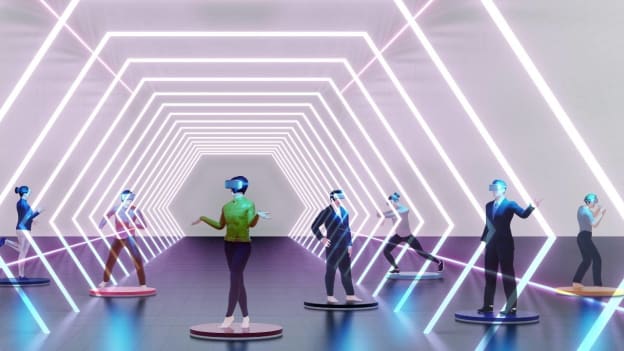Workplaces in the metaverse will result in extensive work collaboration

The corporate ecosystem is undergoing dynamic changes, causing a complete shift in work culture. The talent war is at its peak, and the forthcoming new-generation workforce is at the centre of this shift.
One of the most important factors that are moulding the future of work is the gradual assimilation of Metaverse into the corporate world. The actuality of work-life balance was inferred in its truest sense in the post-pandemic world. However, remote working still continues to have certain challenges that are unaddressed.
By synergising physical atoms with binary digits to deliver an immersive-rich experience, Metaverse is carving out a promising space of its own in the workplaces of the future. While the execution of Metaverse continues to be defined, it is apparent that Metaverse will bring a disruptive wave that will lead to mass adoption gradually.
According to McKinsey, more than USD 120 billion has been invested in the first five months of 2022 in building Metaverse technology and infrastructure, which is more than double the total investment of USD 57 billion it saw in all of 2021.
The idea of a Metaverse is not new for some, but the thought of invigorating existing technologies to create an evolved virtual world for everyone while foreseeing the innumerable opportunities it can deliver; is fairly exhilarating.
For the uninformed, Metaverse is much more than just virtual reality, gaming, and digital avatars. It’s about experiencing real-life scenarios in the virtual world with a more engaging and collaborative approach. But it is the workplaces where the Metaverse will have the most significant impact on all of us.
The Metaverse is set to reshape the world of work with engaging collaboration, AI-enabled colleagues, and learning and skill development through augmented and gamified technologies.
Work in tandem, virtually!
Metaverse allows remote working employees to connect in a more immersive way that cannot be achieved with just a video call.
Imagine sitting at home while experiencing going in and out of your virtual office, or meeting rooms, giving a live presentation, hanging out in an employee networking lounge while virtually connecting to your colleagues, or visiting a conference centre, all in real-time.
While this may sound like a much-hyped form of working with your team, wait till you see the productivity of such work models. Graphic units can ideate, design, and easily sketch in a collaborative virtual notebook, instead of doing back and forth by sending each other their files multiple times in a chat room.
Event planning and exhibition teams could even build and design graphics for their events more efficiently, using collaborative virtual tools in real-time, as naturally as they would decorate their venues.
Shifting remote collaboration from a one-dimensional experience to a multi-dimensional one will further uphold the existence of Metaverse for designers in the industrial sectors. Working or monitoring a simulation of real-world objects in 3D that are interactive will boost innovation.
A digital gofer
Through augmented workspaces, Metaverse aims to link real and digital lives while creating spaces for engaging and enhanced user interaction using Augmented Reality/ Virtual Reality tools and even blockchain.
In a Metaverse-enabled workplace, employees will not just find their colleagues in digital avatars but will be joined by digital colleagues that are AI-powered human-like bots. This will be nothing like commanding a voice assistant speaker to order groceries or play a song, but instead, it will be a whole new level of digital assistance in one’s daily tasks.
These bots will cut down on the employees’ workload by taking up time-consuming and complex tasks for the latter to focus on productive and value-added tasks.
Upskilling virtually
Metaverse-mixed reality offers a disruptive method of skilling that optimises and simplifies training through AR/VR. A study conducted by PwC revealed that employees trained in VR simulations learn four times faster than classroom learners and twice as fast as e-learners.
The Metaverse modules of skilling and training involve interactive and 3D-like engagements to have an in-depth understanding through an interesting and enjoyable process.
Simulating real-life scenarios of teams working on a machine and allowing trainees to follow the same path to learn from the machine in a 3D and interactive manner simply elevates the level of learning.
While Metaverse is worth looking forward to, it is equally important to demystify its challenges. Companies need to strategise, not just on conceiving the idea of Metaverse but also on leveraging it to fuel the company’s growth.
Leaders will have to chalk out a roadmap that ensures operating Metaverse is ethical and safe. A fresh approach is necessary to tap into potential applications that can boost the business. After all, technology has always sided with the ones who identified how to leverage it better.















